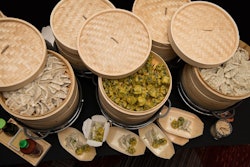
Jack Raben is the executive chef of Lurcat Catering, a Florida-based full-service catering firm located in the Naples Botanical Garden. Raben and his team use organic and sustainable ingredients grown right in the garden, as well as meats sourced from local farmers, to create “garden-to-guest” cuisine. Raben began his career as a sous chef for Jean-Georges Vongerichten, and received culinary training at the Art Institutes of Minnesota and of Arizona.
1. Think outside the box.
Sustainable food goes further than what people typically think of. Beyond sustainable beef and poultry, cheeses, eggs, caviar, et cetera can all be sourced sustainably. At Lurcat Catering we work with sustainable shrimp farms in Iowa and cheese-makers in Florida. We also use local honey, spice blends, and hot sauces.
2. Local is key.
It is important to use local ingredients for both flavor and uniqueness of the dish. Using local ingredients also helps the supplier, whether it be a small farmer, a cheese shop, or a beekeeper keep their operation successful and profitable.
3. Shop at small businesses.
Now that using sustainable practices is trendy, there is a push for everyone—not just chefs—to find the small, unique shops that sell local hot sauces, jams, pickles, and other things. Finding a shop like this is always fun, and important to promote as a way of giving back to the community.
[PULLQUOTE]
4. Don’t sacrifice appearance.
When you’re looking for a way to ensure your dish is sustainable and eye-catching, I like to reference the book On Vegetables by Jeremy Fox. I love using the plant “tip to tail” to garnish along with dill flowers, dried herbs, fermented garlic, and other local plants depending on where you are located.
5. Reduce, reuse, recycle.
A great way to keep event food sustainable is to repurpose ingredients. You should always be thinking about how things can be used in a different way. If something can’t be repurposed, we often donate the food to reduce food waste.



















